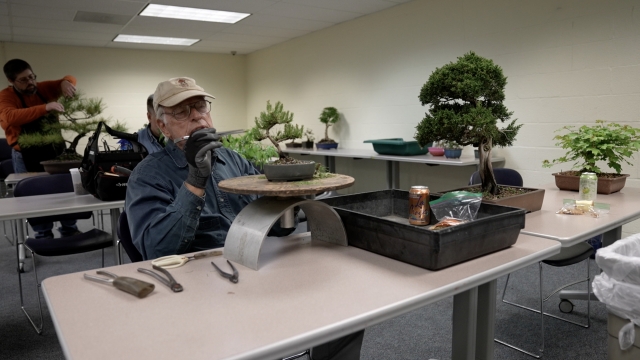Jim Sullivan stands in the backyard of his Baltimore, Maryland, home, with a tiny pair of scissors in hand. In front of him, is a miniature version of a white pine tree. With the kind of precision you might expect from a surgeon in an operating room, Sullivan meticulously gets to work on the Bonsai collection he's been working on for decades.
Sullivan, 81, is a retired mechanical engineering technician for the National Institutes of Health. His job was often filled with stress and anxiety, which is why Sullivan first turned to Bonsai. It was his outlet to get away from it all.
"Bonsai was a way to relax," Sullivan said.
He spends his free time meticulously caring for the numerous Bonsai trees he's collected over the years. Care for these miniature landscapes requires precise attention to detail, which often mimics life.
"There's an aging process," he said. "If you're lucky, it (the tree) will outlive you and your grandchildren. It's a process of life."
SEE MORE: Some Americans turn to home gardens as grocery prices rise
It turns out Sullivan isn't alone in his love for this ancient art rooted in Japanese culture. Bonsai is the art of growing ornamental, artificially dwarfed trees or shrubs. And lately, there's been a lot of green in the Bonsai market.
Much of the growth is from Americans looking for new ways to relax.
"You can devote as much time or as little time as you want to," Sullivan said.
While Bonsai may be new for some, it's a time honored tradition for others, including Michael James, who serves at the curator for The National Bonsai and Penjing Museum in Washington, D.C.
"Decisions have to be made for the health of the tree," James said as he worked to prune a trident maple Bonsai.
James' work never ends. He's always pruning the trees to be perfectly balanced and small.
"The size of the leaves tells the vigor of the tree," he added.
SEE MORE: The hidden life of trees
Bonsai didn't reach North America until after World War II. One tree at the National Arboretum is 400 years old and was gifted to the U.S. after it survived the bombing of Hiroshima in Japan.
"This tree has seen a lot, it's lived through a lot," James noted.
It's that resilience that many people identify with in Bonsai, especially recently. Since the pandemic, attendance at the National Bonsai and Penjing Museum has often doubled.
"They certainly speak to timelessness and how much patience and dedication," visitor Bert Beauliau said.
There's another reason behind Bonsai's growing popularity. According to a study by the University of Minnesota, gardening can often, "positively impact mood and brain chemistry."
Data tracked by the American Bonsai Society show that there are now more than 220 Bonsai clubs across nearly every U.S. state, including Alaska and Hawaii.
"There's a lot of research that leads to the belief that plants and gardening can be therapeutic — the repetition, the calisthenics, the exercise, just being outside in fresh air," James explained.
Trending stories at Scrippsnews.com




